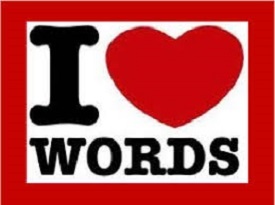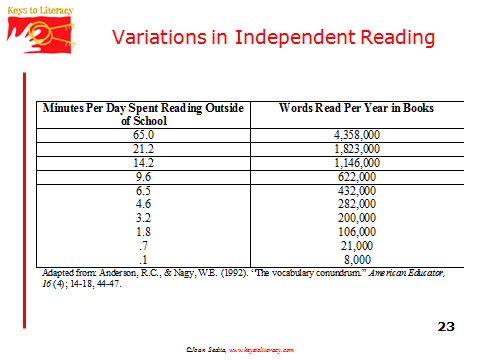Creating a Word Conscious Classroom

Word consciousness is “awareness and interest in words and their meaning” (Graves & Watts-Taffe, 2008). While word consciousness is just one aspect of effective vocabulary instruction, I believe it is the most important way to motivate students to read and build their vocabulary. Teachers who share their love for words (logophilia) and who provide engaging opportunities to interact with words across all content on a daily basis will ignite this word learning passion in their students.
A word conscious classroom must have a wide variety of reading materials available, as they will become the primary source for students to encounter new words. Most of the vocabulary that students attain after the third grade can be attributed to the incidental learning of words from context while reading. Teachers must provide time on a regular basis for students to self-select quality reading materials during school, as many students do not read outside of school. The chart below shows the correlation between the amount of time spent reading and the exposure to words – a direct correlation to vocabulary acquisition. As you can see, if students do not read often, their vocabulary will suffer: “The rich get richer and the poor get poorer.” This is known as the “Matthew Effect.”
Teachers of any subject can build student curiosity about words by teaching etymology, the origin of words and their historic development. Discovering the earliest use of a word, as well as how that word may have changed in form and meaning from one language to another, can be an interesting journey. To access a free online etymology dictionary, go to: www.etymonline.com.
Different types of word play associated with onomastic, the study of the origin and form of names, is also exciting and relevant for students. The following books are devoted to such word play: “Names and Games” by R. Eckler (1986), “What’s in a Name?” by P. Dickson (1996) and the “Dictionary of Word Play” by D. Morice (2001).
Robert Marzano’s “Vocabulary Games for the Classroom” (2010) is one of my favorite vocabulary resources. This book provides all K-12 teachers with a wide variety of games to build both academic and general vocabulary. In addition, there’s no shortage of informative websites on these topics complete with free games, lesson plans and classroom activities. Here are a few suggestions:
One of my favorite past times is visiting yard sales to find the latest word play games. Scattergories and Outburst are two great word category games, and acting word games (e.g., Charades) are also a big hit with students. Pictionary, which prompts students to draw their vocabulary words for students to guess, is also very popular, and word learning games (e.g., Scrabble, Boggle and Password) are a must.
Of course, any opportunity to play with language – such as palindromes, anagrams, idioms, figurative language, hink pinks, jokes and riddles – causes students to be active learners, which is key to the development of word awareness. Neologism, which entails having students create their own words by combining parts of existing words (e.g., rescandal, a scandal that is the same as an earlier scandal), is an excellent way to develop word consciousness. Logology is the term used to refer to all forms of word and language play.
Joan Sedita’s book “Keys to Vocabulary Routine” is a great resource for effective vocabulary instruction and strategies for K-12 teachers. Her routine has five components: previewing for difficult vocabulary, connecting vocabulary to prior schema, teaching words in depth, identifying opportunities to teach word learning strategies (e.g., context clues and word parts) and promoting word consciousness (see chapter seven). For free vocabulary and literacy resources on word consciousness and a variety of other topics, visit the Keys to Literacy website.
Leave a Reply
4 Comments
Trackbacks/Pingbacks
- Science of Reading for Secondary: Boosting Vocabulary Instruction – TeachersFirst Blog - […] a genuine interest in words. Donna Mastrovito makes a case for a word-conscious classroom in this Keys to Literacy…


 Before becoming a Keys to Literacy trainer, Donna served as a classroom teacher, Reading Recovery teacher, reading specialist and literacy coach. Donna is also an adjunct professor at American International College (AIC), where she teaches a variety of literacy courses and supervises practicum students.
Before becoming a Keys to Literacy trainer, Donna served as a classroom teacher, Reading Recovery teacher, reading specialist and literacy coach. Donna is also an adjunct professor at American International College (AIC), where she teaches a variety of literacy courses and supervises practicum students.
Love!!!
Excellent explanation of word literacy but I would suggest including a briefing about word games and have some gameplay with kids in the classroom so that they can learn and fun together.
Great comment about the value of using word games to build interest in students for learning new words!
Great Article! Thank you for sharing this is very informative post, and looking forward to the latest one.